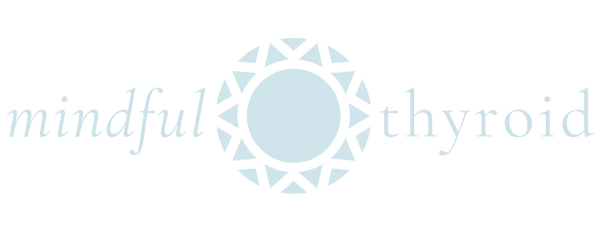

You aren't stuck with thyroid symptoms.
I wish someone would have told me this when I first experienced Hashimoto's Autoimmune Thyroid over 20 years ago. I wouldn't have wasted so many years feeling ill and would have made changes a lot sooner in my life. So I'm dedicating this blog to all the women who need to hear this right now. Your diet and lifestyle choices play a huge part in the overall health of your thyroid, hormones and general well-being.
In this article, I answer some of the most common questions regarding thyroid health and lifestyle changes for Hashimoto's, with my recommendations for how to implement them.
What Nutrition Plan Should I Follow?
This is the big question. Everyone wants to know what to eat to lose weight and feel better. However, each body is unique and while there are some general recommendations I have, you'll need to experiment with what you can tolerate, what types of foods you enjoy and the impact of cooking to your life.
When I started doing nutrition coaching, each client had very specific foods they could eat or tolerate, different food preferences and cooking/prepping concerns. So while the recommendations were similar, we structured the food within these guidelines to fit each person.
You will reduce your toxin load and improve nutrient deficiencies with a diet that is based on organic, non-gmo fruits, vegetables, leafy greens, whole gluten free grains, legumes, quality protein and healthy fats. The majority of your meals should be prepared fresh at home and not from a package. Strive to eat fiber, healthy fat and protein at each meal to maintain proper blood sugar balance and limit refined sugar. I do advise to eliminate gluten and even dairy depending on your symptoms, as these are highly inflammatory.
Some people may need to try an elimination diet to heal their gut, reduce food intolerances and/or reduce bacteria overgrowth. There are pros and cons to each of these diets that I describe in my Hashimoto's Nutrition Guide and depending on your specific health concerns, one may be better for you than another. Gut health protocol diets that I recommend are:
- Gluten & Dairy Free
- Paleo
- AIP (short term)
- SCD/GAPS
- SIBO diet (for confirmed SIBO cases, in addition to herbal regimen)
These diets should be seen as tools to help you achieve a goal of creating better gut health and reducing gram-negative bacteria and/or yeast. As you begin to feel better the goal is always to get as much variety of healthy food back into the diet as possible.
Hashimoto’s clients should also be cautious of high iodine containing foods like spirulina, chlorella, kelp and seafood as it can increase the autoimmune attack on the thyroid (1). Experiment with what you can tolerate; some people are more sensitive to high iodine foods than others.
To learn more about elimination diets, how to be successful on a reduced diet and how to go gluten free the right way, check out my comprehensive e-book.
How Is Gut Health Related To Hashimoto's?
Autoimmunity begins with a leaky gut where food particles, bacteria, viruses and toxins cross through breaks in the tight junctions of the mucosal layer of the intestines and into the bloodstream. The immune system then mounts an attack against these invaders and may end up attacking your own tissues that have similar protein makeup. Gluten and casein (dairy) proteins are very similar to thyroid hormone proteins and can increase the autoimmune attack on the thyroid (2). Having an imbalance of gut bacteria, whether SIBO, Candida overgrowth or just not enough healthy bacteria also impacts the immune system and the body’s ability to maintain intestinal wall integrity and properly absorb nutrients.

Hashimoto’s disease that’s not well managed with lifestyle, diet and possibly medication, leads to a slow digestion process. There is typically low stomach acid levels, bacteria overgrowth, constipation, poor nutrient absorption and a cascade of other health issues that begin in the gut and are associated with autoimmune thyroid disease (3). By improving nutrition, bowel movements and overall bacteria imbalances, you will resolve many Hashimoto’s symptoms and begin to restore balance to the body.
Practical Tips To Improve Gut Health
- Anti-inflammatory and gut healing diet (remove sugar, caffeine, alcohol, gluten, dairy, soy and other known food sensitivities).
- Choose higher quality foods including organic, non-gmo (when not selecting organic), wild caught fish/seafood and pasture raised meats and eggs.
- Lemon water or apple cider vinegar mixed in water in the morning to help stimulate stomach acid to digest food better
- Green juices and green smoothies to improve bowel movements
- Prebiotic foods - artichoke, asparagus, onion, garlic, leeks, sweet potato (cooked and cooled to create resistant starch) and green leafy vegetables to feed good gut bacteria
- Probiotic food or supplements - kimchi, sauerkraut, miso, kombucha tea, coconut yogurt or high quality supplement to rebuild microbiome
- Bone broth and collagen powder - sip bone broth or create soups weekly with stock (not broth) and add collagen powder to smoothies, soups or tea to help repair the gut lining
- Add more fiber - include cruciferous and other vegetables to each meal as fiber helps to feed the good gut bacteria and balance blood sugar levels. Include whole gluten free grains and legumes (if tolerated).
How Can I Lose Weight?
Weight loss has many factors and isn’t only about exercising more or eating less calories. With Hashimoto’s it's important to bring hormones back into balance. You can do that with eating a nutrient dense, whole foods diet with plenty of healthy fats and minimal sugar to balance blood sugar levels.
You may also need to avoid caffeine to bring cortisol and adrenal function back into balance. Proper nutrition is the cornerstone of losing weight, but getting enough sleep, exercising and managing stress levels are just as important to reduce cortisol levels and balance blood sugar.
If you’re hypothyroid it's easy to feel overwhelmed trying to make lifestyle changes, so make sure you are getting the right medication if you’re just not able to function well. As you begin to incorporate lifestyle and diet changes you may be able to reduce the need for medication over time. Consistent action towards eating fresh, unprocessed food and finding exercise that you enjoy will help you achieve your weight loss goals.

One of my tips for clients that are too tired to exercise is to implement a 5 minute rule. Even if you're really fatigued, you can do something for 5 minutes.
- Take 5 minutes to jump on a rebounder/trampoline, go for a 5 minute walk or do 5 minutes of squats/pushups or stretching.
- If you feel like you can do more, push yourself in 5 minute intervals. So you're only looking ahead 5 minutes at a time to limit any overwhelm.
By doing something, even a few minutes of activity, you set yourself up for success and limit the negative feelings of defeat if you didn't attempt any physical activity that day. I find that most clients can do more once they've started and even if they don't, they still feel successful for the day.
What Vitamins Should I Take?
I always like to emphasize getting nutrients from food as the primary source. However, there are some supplements that are helpful and can be used to replenish or bring up nutrient levels quicker. Hashimoto’s clients commonly have nutrient deficiencies due to several factors:
- Poor diet or not eating nutrient rich food
- Inability to absorb nutrients (lack of enzymes, low stomach acid)
- Bacteria imbalances
The most common deficiencies or sub-optimal levels are Vitamin D, Zinc, Iron (serum ferritin), Selenium, Magnesium, Omega 3, and B Vitamins (4). Vitamin D is important for immune function and reducing inflammation. Zinc, B vitamins and Selenium are necessary for converting thyroxine T4 hormone to T3 for energy. Magnesium and Omega 3 are vital for reducing overall inflammation. You can get a micro-nutrient blood test done by Spectracell to see if you have these or other deficiencies to be sure you’re supplementing properly.
To get the most nutrients from your food, I recommend buying organic and non-gmo produce, pasture-raised eggs and grass-fed meats to get higher quality nutrients, vitamins and minerals. Include plenty of vegetables and leafy greens which contain magnesium, folate, B vitamins, potassium and calcium. You can additionally add a multi-vitamin, vitamin D3, magnesium supplement, omega 3 fish oil and B vitamins. My clients have access to supplement protocols with a 10% discount through my supplement dispensary.

Nutrient Dense 7 Day Meal Plan
Nutrient deficiencies listed above will reduce thyroid hormone function and lead to additional symptoms associated with those nutrients. Learn all about micronutrients and what foods to eat for better thyroid function in my nutrient dense 7 day meal plan designed for Hashimoto's. It includes 10 gluten free and dairy free recipes, a grocery shopping list and meal prep instructions to help you regain your energy.
What Exercise Should I Do?
For those that are actively hypothyroid you’ll benefit from exercise that will give you a boost of energy. Try jumping on a trampoline or doing a short high intensity workout session around 15-30 minutes. If that feels like too much then walking and some light resistance training are also beneficial.
If you’re experiencing hyperthyroid symptoms it’s important to focus on stress reducing activities like yoga, stretching and walking. It may be difficult to do any other exercise that increases heart rate as palpitations and increased heart rate are symptoms you're likely already experiencing.

If your Hashimoto’s is managed and thyroid levels are good, then do the exercise that you enjoy! I recommend a combination of strength training to build muscle, some form of cardio you enjoy that gets you to sweat and yoga, pilates or stretching for stress reduction and lower intensity activity.
Set a goal and aim to workout at least 30 minutes (you may need to work up to that or do less at times) about 4-5 days per week. You can be really structured and do a workout program or go with the flow and try something different each day based on how you're feeling.
How have your thyroid symptoms improved with lifestyle and diet changes? Share in the comments.
References
- Leung A, Braverman L. Consequences of excess iodine. Nat Rev Endocrinol. 2014Mar;10(3):136-42. doi: 10.1038/nrendo.2013.251.
- Alkader DAA, Asadi N, Solangi U, et al. Exploring the role of gut microbiota in autoimmune thyroid disorders: a systematic review and meta-analysis. Front Endocrinol. 2023 Oct 27;14:1238146. doi: 10.3389/fendo.2023.1238146.
- Gong B, Wang C, Meng F, et al. Association between gut microbiota and autoimmune thyroid disease: a systematic review and meta-analysis. Front Endocrinol (Lausanne). 2021 Nov 17;12:774362. doi: 10.3389/fendo.2021.774362.
- Knezevic J, Starchl C, Tmava Berisha A, Amrein K. Thyroid-gut-axis: how does the microbiota influence thyroid function? Nutrients. 2020 Jun 12;12(6):1769.doi: 10.3390/nu12061769.




